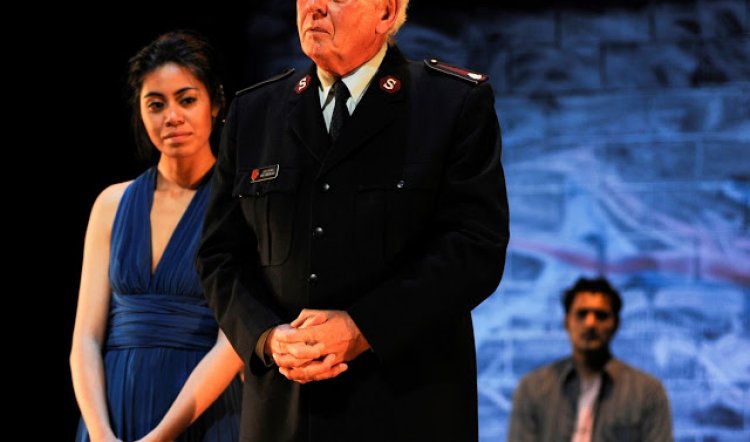
DEAD MAN BRAKE
DEAD MAN BRAKE, Merrigong Theatre Company at IPAC, August 30-September 7 2013. Photos by Heidrun Lohr: Sabryna Te'o, Philip Hinton.
It's ten years since the train crash at Waterfall that killed seven of the 47 people aboard an early morning service from Sydney to Wollongong. To those involved or touched by the event it may well still be as vivid as yesterday, which makes the writing of a play about the tragedy a tricky undertaking. Alana Valentine is not a stranger to verbatim and reality-based theatre, her previous successes - Parramatta Girls and Run Rabbit Run - are reminders of her skill and sensitivity as a dramatist when dealing with real life memory and pain. Dead Man Brake is at once similar and different to those predecessors, both in style, content and outcome.
Nevertheless, there is little drama in Dead Man Brake which is curious given that it's an eye-witness account of being a passenger in a double-decker train as it careers off the track and into a rock wall at 117km an hour. However, the writer's, director's and producer's program notes gives some indication of why this inherently shocking and potentially fascinating event has been given such anodyne treatment.
Producer Simon Hinton writes, "…we hope…it stands as a tribute…to all who strive to overcome suffering and to all who assist them." Playwright Alana Valentine writes, "…dedicated to all those who strive to assist others in their times of grief, loss and hardship…" and director Anne-Louise Rentell writes, "…a desire to find meaning or to make sense…is a natural human reaction…I was inspired…and wanted to incorporate elements of these rituals (particularly singing) into our reading of Alana's script…a place of remembering…and honouring…" and so on. It's all very reverent and well-mannered, which doesn't make for terrific theatre.
By its nature, the western tradition of tribute and remembering in such circumstances is inherently polite, undramatic and frankly is of little interest to those outside the immediate catchment of tragedy, loss and grief. If dramatic construction and the other ingredients of theatrical catharsis are injected, there is perhaps a risk of voyeurism by outsiders and fresh hurt to insiders.
It's a dilemma - which may be why the Granville train disaster was more than two decades in the past before The Day of the Roses was made for television; and why those calamities that are turned more quickly into entertainment tend to have "happy" endings. (Beaconsfield - the two surviving miners were trapped underground in 2006 and it was relived on screen in 2012; and Heroes' Mountain saw the 1997 survival at Thredbo of Stuart Diver dramatised in 2002.)
Instead, in Dead Man Brake we have the unwelcome experience of hearing, at least a couple of times, a version of the tantalising and ultimately frustrating statement, "I won't say more, out of respect." Unfortunately, as any halfway decent storyteller knows - that's where the story really starts!
In this instance the story starts with an immediate indication of what lies ahead: out of the darkness comes the threnodic notes of a church organ (music and onstage playing: Daryl Wallis) and the voice of a glitter-decorated figure (an angel? a spirit?) in the form of Sabryna Te'o. She is joined by an invisible choir (the rest of the cast) and they slowly emerge from the shadows in the stately, solemn, eyes-cast-down style most often employed to signal matters of great moment (think state funerals of notables). It is difficult - at this point - not to feel equally gloomy at the prospect of the hour and 40 minutes that lies ahead.
The greatest problem with "real life" (see review on this site of Miss Julie) is that with the best will in the world, it's never well constructed and is rarely consistently interesting. Without the intervention of the editing process and a ruthless dramatist verbatim accounts and court or inquiry documents are just so many words - and mostly there are too many. As well, Dead Man Brake has a strong whiff of theatre-by-committee as the various special interests - survivors, rescuers, onlookers, bystanders, relatives etc - get their share of the spotlight. The Salvation Army officer (Phillip Hinton) for instance, is undoubtedly a splendid chap but is also a well meaning bore.
On the other hand, Katrina Retallick as ABC journalist Nonee Walsh injects much needed levity and colour as she relates how technology conspired to make her miss the news scoop of the decade. She is also a performer who is - sad to say - in a different league and her moments in the sun highlight uneven performances and material.
Approached without such deference and with a free hand to entertain (the structure is back to front) Dead Man Brake could be enthralling theatre and at the same time, honour the victims and others. As it is, whether anyone will be interested outside those immediately affected is a question that should probably have been asked at a much earlier stage of this opportunity lost. (A full Saturday afternoon house at IPAC was subdued, sleepy and fidgety but applauded quite enthusiastically at the end.)



